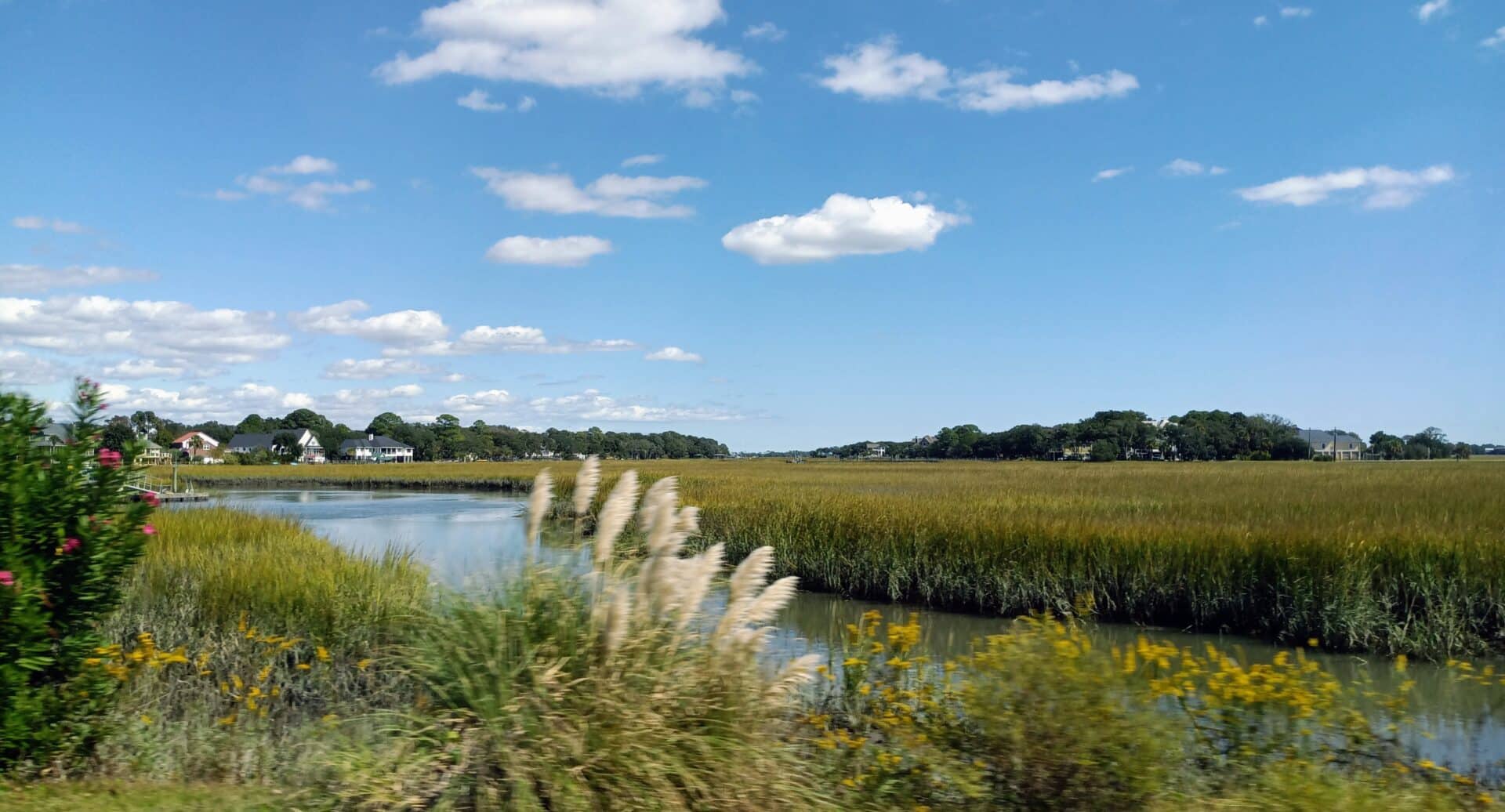When buying land in South Carolina, where do you start? The Palmetto State is full of diverse landscapes from rolling countryside to scenic coastal towns. It boasts a robust agriculture and tourist economy, with lots of available land for personal use, recreation, development, and investment.
Thanks to the booming land market, there’s no better time to expand your South Carolina acreage. Luckily, the experts at Land.com are here with a step-by-step guide on how to buy land in South Carolina, helping new landowners navigate this exciting purchase and secure property with confidence.
Here’s what to do before buying land in South Carolina.
Step 1: Know What You Want—And What’s Possible
At the start of your search, it’s helpful to narrow down your options based on your needs and goals. Location is certainly important, but it’s not the only factor to consider.
Think about your must-haves for the type of property you want. For instance, are you looking for a private family homestead? Are you looking for beachfront land for sale? A seasonal rental? Hunting land or farming acreage?
In South Carolina, all this type of land is available—and more. Defining a clear goal as soon as possible will guide your next steps and help make the buying process that much smoother.
Step 2: Explore the Best Areas to Buy Land in South Carolina
South Carolina is a treasure trove of stunning views, rural landscapes, and urban areas alike. Whether you’re in the market for laid-back residential life like in Colleton county or Laurens County, or up-and-coming investment potential in Spartanburg County, the state offers something for every landowner.
Here’s what to know before buying land in South Carolina—the state’s current hotspots.
- Lowcountry – Located between Charleston and Savannah, the scenic Lowcountry is a year-round tourist destination along the southern coast, perfect for residential and commercial opportunities alike. Prospective landowners will love the potential for waterfront land, whether for a full-time home or a rental property. Counties in the Lowcountry region include Charleston County, Colleton County, Berkeley County, and Beaufort County, all known for their charm, history, and growing appeal for land buyers.
- Upstate – The Upstate region, also known as the Upcountry, is located in the northwest corner of the state. This mountainous area is full of breathtaking views, endless hiking trails, and lush waterfalls for the outdoor enthusiast and weekend adventurer. Featuring cultural centers, historic houses, and outdoor attractions, the Upstate community is great for residential land, rental properties, or commercial investments. Counties in the Upstate include Greenville County, Spartanburg County, Pickens County, Anderson County, and Oconee County, offering a wide range of South Carolina land opportunities for every lifestyle.
- Greenville – Technically part of the Upstate region, Greenville stands out as an up-and-coming city with a small-town feel. Beautiful natural landscapes meet interesting cultural attractions, complete with an award-winning culinary scene. This fast-growing city is a prime location for investment opportunities.
- Charleston – The largest city in South Carolina, Charleston is a bustling urban hub that’s retained its Southern charm. This port city is full of historical attractions, along with nearby beaches and hiking trails. Whether you’re wondering where to buy beachfront property, a residential home, or a commercial investment, Charleston has it all.
Once you narrow down the areas you’re interested in, it’ll be that much simpler to search for available, developed land or raw, untouched land.
Step 3: Zoning, Easements, and Land Use—Read the Fine Print
Simply put, zoning laws regulate land usage in certain areas. There are various zoning categories in South Carolina, including residential, commercial, agricultural, and mixed-use. Before purchasing property, ensure that local zoning laws won’t restrict your intended goals.
In South Carolina, you may also encounter land use regulations such as:
- Conservation easements –This legal agreement protects property from residential and commercial development. Easements are included in real estate transactions—they’re permanent and apply to all future landowners. Conservation easements in South Carolina are intended to protect natural, agricultural, scenic, historical, and/or recreational land. Before buying land, research potential easements to know what is and isn’t allowed on the property.
- Flood zones – As a coastal state, South Carolina has a high flood risk. In order to reduce flood damage, promote community safety, and protect the environment, regulations restrict how landowners use their property. For instance, construction in flood zones requires certain permits, and flood maps determine land use planning across the state.
- Setbacks – Similarly, South Carolina has setback regulations that determine how far back structures must be from the water’s edge. In the case of flood hazard areas, this also includes building structures on high ground.
Research regulations like these early on to navigate them as effectively as possible, or even change your search criteria.
Step 4: What’s Included? Utilities, Road Access, and Hidden Costs
Purchasing property involves more than the selling price of acreage. Landowners become responsible for a range of long-term costs, and it’s important to include these expenses in your budget.
We’re not just talking about taxes (more on those later), but also baseline costs associated with everyday essentials. For instance, determine whether or not a property has:
- Utilities (water, electricity)
- Septic systems
- Wells
- Road access
If these systems are not set up, there may already be infrastructure in place to do it yourself. However, raw land without these essentials means higher costs for the buyer. Infrastructure can be expensive and difficult to install, especially in rural areas.
Even remote hunting land needs a functional access road in order to enjoy it. So, don’t overlook this step—it’ll help you avoid unexpected expenses after closing.
Step 5: Work with a Land Specialist Who Knows South Carolina
Connecting with a land-savvy agent is one of the best ways to secure your dream acreage at a fair price. A local real estate agent can streamline the process from start to finish, helping buyers:
- Uncover off-market deals – Having their finger on the pulse of the local community gives local land specialists the advantage of hearing about off-market properties. Plus, their local expertise helps them predict market trends and recommend the best time to buy.
- Navigate legal red tape – Having someone else handle the real estate bureaucracy will not only give you peace of mind but also ensure that important legal matters don’t fall through the cracks—and you don’t fall for any scams.
- Negotiate a better price – Land agents will take care of the back-end work of a real estate transaction. They’ll make all the phone calls, handle any back and forth with the seller, recommend a fair price for both parties, and use professional skills to negotiate the best deal possible.
- Access insider knowledge – Local agents have on-the-ground experience when it comes to the climate, community, tourism trends, and more. They’ll be able to give you a true feel for the area and answer questions that a seller can’t.
Especially in rural or high-demand areas, land specialists are an unmatched resource when buying acreage.
Step 6: Cash or Loan? Figuring Out Your Financing
While you can pay for land out of pocket, it’s not necessary to have that kind of cash on hand. Instead, there are a variety of financing options available for a land purchase, such as:
- Traditional mortgage – Buyers apply for a loan from the bank, make a downpayment, and repay the mortgage with interest over time.
- Land loans – Specifically for acreage, land loans are a type of credit similar to a mortgage, in which a bank, credit union, or other lender sets the terms of the down payment, interest, and repayment schedule.
- Seller (owner) financing – Instead of involving a third party, the seller acts as the lender. The buyer and seller work together to establish fair terms and negotiate a contract.
- Government funding – The Farm Service Agency (FSA) provides loans for those looking to establish new farms or explore agricultural expansion. South Carolina offers a range of different farm loans through this rural land program.
No matter how you finance your land purchase, position yourself for the best rates by working with a land professional and setting a strict budget.
Step 7: Protect Your Investment with a Survey and Title Search
Land surveys reveal exact property lines, helping prevent future boundary disputes with neighbors. On the other hand, a title search will show a property’s public records, including legal ownership, unpaid taxes, unrecorded easements, or outstanding lawsuits. Having all this information is key to avoiding unexpected legal claims and other costly issues after a sale.
Step 8: Understand Property Taxes and Ongoing Costs
When creating your budget, be sure to factor in additional costs based on location and land use. These expenses can include:
- Property taxes (note agricultural tax exemptions)
- Maintenance costs
- Conservation programs
- Permits
The benefits of holding land long-term far outweigh any costs along the way, but it’s important to budget properly when buying vacant land.
Step 9: Make an Offer and Seal the Deal Like a Pro
Make a competitive offer based on location and market trends. As we mentioned, a land specialist is invaluable for this step. When your offer is accepted, carefully review the contract with an agent or lawyer. If there are any contingencies, make sure you can hold up your end of the bargain.
After signatures and closing paperwork, the land is yours!
Find Your Perfect South Carolina Land with Land.com
Explore land for sale in South Carolina on Land.com. Conveniently filter by location, average, budget, and more to find the property that matches your vision.
With the right resources, buying land is not only a smart investment but also a seamless process. Connect with a local Land Pro today to discover your dream South Carolina property.
Sources:
Lowcountry Council of Government. Welcome To The Lowcountry. https://www.lowcountrycog.org/about/region/index.php.
Upcountry South Carolina. Attractions. https://upcountrysc.com/explore/attractions/.
Visit Greenville. Greenville, South Carolina. https://www.visitgreenvillesc.com/.
South Carolina Farm Bureau. Conservation Easements 101. https://www.scfb.org/conservation-easements-101.
South Carolina Department of Natural Resources. Floodplain Management in South Carolina. https://www.dnr.sc.gov/water/flood/documents/SCQG_FloodplainManagement.pdf.
Investopedia. Land Loans: Everything You Need To Know. https://www.investopedia.com/articles/credit-loans-mortgages/090716/land-loans-3-things-know-you-buy-land.asp.
Investopedia. Title Search: What It Is, How It’s Done, and Title Insurance. https://www.investopedia.com/terms/t/titlesearch.asp.


